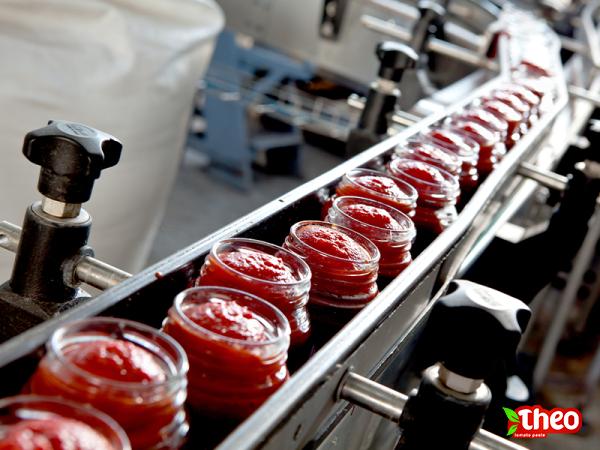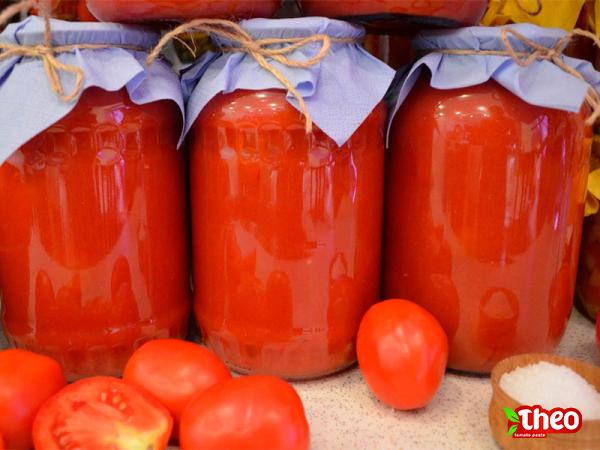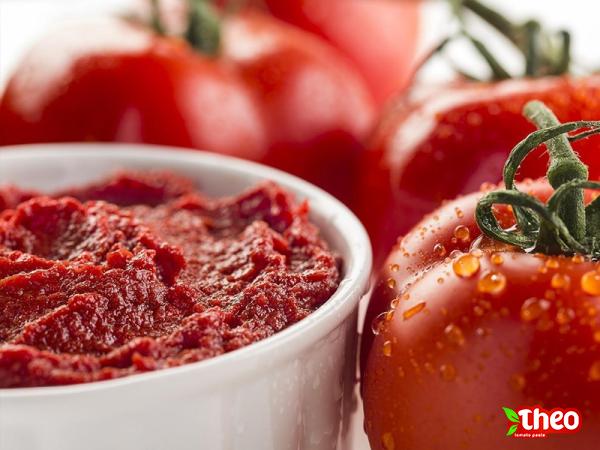Exploring the Benefits and Popularity of Organic Tomato Paste in Glass Jars Introduction: Organic tomato paste has gained significant popularity in recent times due to its numerous health benefits and environmentally friendly packaging. A convenient and versatile ingredient, tomato paste adds a tangy and rich flavor to a wide range of dishes. This summary will delve into the advantages of opting for organic tomato paste, specifically the ones packaged in glass jars, which offer several unique benefits over alternative packaging options. 1. Health Benefits: Organic tomato paste is made from fresh, organic tomatoes that are free from pesticides, chemicals, and genetically modified organisms (GMOs). It contains a high concentration of lycopene, a powerful antioxidant known to have anti-carcinogenic properties and support heart health. Additionally, organic tomato paste is a rich source of essential vitamins and minerals, including vitamin C, potassium, and vitamin K. 2. Sustainability and Environmental Impact: The use of glass jars for packaging organic tomato paste offers a more sustainable and environmentally friendly alternative to other packaging materials like plastic or metal cans. Glass is a natural and recyclable material that can be reused or repurposed, reducing the carbon footprint associated with packaging disposal. Moreover, glass does not release harmful chemicals or substances when exposed to heat, ensuring the integrity and safety of the product. 3. Prolonged Shelf Life: Organic tomato paste in glass jars has a longer shelf life compared to other packaging options. The airtight seal provided by glass jars effectively preserves the freshness and flavor of the tomato paste, extending its usability for an extended period. This durability reduces food waste and allows consumers to stock up on organic tomato paste without worrying about it spoiling quickly. 4. Protection from External Elements: Glass jars act as a reliable barrier against external elements such as light, heat, and moisture. These factors can negatively affect the quality and taste of tomato paste. The use of glass jars ensures that the organic tomato paste remains uncontaminated and preserves its nutritional value, aroma, and taste without any alteration from external factors.

tomato paste
 5. Versatility and Convenience: Organic tomato paste in glass jars offers versatility and convenience in the kitchen. The paste can effortlessly be added to a variety of recipes, enhancing the taste of sauces, soups, stews, and other dishes. Glass jars are easily stackable, making storage more efficient and reducing clutter in kitchen cabinets or pantries. The clear visibility provided by glass also allows users to quickly and easily identify the contents and amount remaining. 6. Aesthetics and Branding: The use of glass jars for packaging organic tomato paste adds an aesthetic appeal to the product, making it visually appealing for consumers. The transparent nature of glass jars allows the vibrant red color of the tomato paste to shine through, creating an enticing visual experience. Additionally, glass is a versatile material that can be easily customized with labels or branding, enabling producers to firmly establish their brand identity and differentiate themselves in the market. 7. Consumer Perception and Premium Quality: Organic tomato paste packaged in glass jars often carries a higher perceived value among consumers, as it is associated with a premium quality product. The use of glass jars conveys a sense of authenticity, craftsmanship, and attention to detail, leading consumers to trust the product more. This perception can positively impact the sales and reputation of organic tomato paste brands. Conclusion: Organic tomato paste in glass jars presents several benefits that make it an attractive choice among health-conscious consumers. Its organic nature, combined with sustainable and visually appealing packaging, makes it a preferred option for those looking for high-quality ingredients with minimal impact on the environment. As the market for organic food continues to grow globally, the demand for organic tomato paste in glass jars is expected to increase further.Title: Exploring the Benefits and Popularity of Organic Tomato Paste in Glass Jars 1. Growing Consumer Demand for Organic Products: The demand for organic food products has been on the rise in recent years, as consumers become more conscious about their health and the environment. Organic tomato paste, with its natural ingredients and sustainable packaging, has gained a strong foothold in the organic food market. In response to this demand, many food companies have started offering organic tomato paste in glass jars to cater to health-conscious consumers.
5. Versatility and Convenience: Organic tomato paste in glass jars offers versatility and convenience in the kitchen. The paste can effortlessly be added to a variety of recipes, enhancing the taste of sauces, soups, stews, and other dishes. Glass jars are easily stackable, making storage more efficient and reducing clutter in kitchen cabinets or pantries. The clear visibility provided by glass also allows users to quickly and easily identify the contents and amount remaining. 6. Aesthetics and Branding: The use of glass jars for packaging organic tomato paste adds an aesthetic appeal to the product, making it visually appealing for consumers. The transparent nature of glass jars allows the vibrant red color of the tomato paste to shine through, creating an enticing visual experience. Additionally, glass is a versatile material that can be easily customized with labels or branding, enabling producers to firmly establish their brand identity and differentiate themselves in the market. 7. Consumer Perception and Premium Quality: Organic tomato paste packaged in glass jars often carries a higher perceived value among consumers, as it is associated with a premium quality product. The use of glass jars conveys a sense of authenticity, craftsmanship, and attention to detail, leading consumers to trust the product more. This perception can positively impact the sales and reputation of organic tomato paste brands. Conclusion: Organic tomato paste in glass jars presents several benefits that make it an attractive choice among health-conscious consumers. Its organic nature, combined with sustainable and visually appealing packaging, makes it a preferred option for those looking for high-quality ingredients with minimal impact on the environment. As the market for organic food continues to grow globally, the demand for organic tomato paste in glass jars is expected to increase further.Title: Exploring the Benefits and Popularity of Organic Tomato Paste in Glass Jars 1. Growing Consumer Demand for Organic Products: The demand for organic food products has been on the rise in recent years, as consumers become more conscious about their health and the environment. Organic tomato paste, with its natural ingredients and sustainable packaging, has gained a strong foothold in the organic food market. In response to this demand, many food companies have started offering organic tomato paste in glass jars to cater to health-conscious consumers.
Specifications of tomato paste
 2. Health-Conscious Lifestyle Choices: Consumers are increasingly opting for healthier food options that are free from pesticides, synthetic additives, and GMOs. Organic tomato paste meets these criteria by being made from organically grown tomatoes without the use of harmful chemicals. The glass jar packaging further enhances the health benefits of the product by ensuring there is no leaching of potentially harmful substances from plastic or metal cans. 3. Market Expansion and Growth Opportunities: The market for organic tomato paste in glass jars is expanding rapidly, driven by factors such as increased consumer awareness, rising disposable incomes, changing lifestyles, and growing culinary preferences. This growth presents a significant opportunity for businesses to tap into the organic food market and diversify their product offerings. Companies can leverage this trend by introducing their own line of organic tomato paste in glass jars or partnering with organic food producers to distribute their products. 4. Meeting Consumer Expectations for Sustainable Packaging: Glass jars are seen as a more sustainable option compared to other packaging materials such as plastic or metal cans. Consumers are increasingly concerned about the environmental impact of their purchasing decisions, and sustainable packaging is a key factor in their decision-making process. By using glass jars, businesses can position themselves as environmentally responsible and meet the expectations of eco-conscious consumers. 5. The Influence of Social Media and Online Reviews: Social media platforms and online reviews have a significant influence on consumer behavior. Consumers often rely on online platforms to seek recommendations, product information, and reviews before making purchasing decisions. Businesses can leverage this trend by actively engaging with consumers on social media, sharing information about their organic tomato paste in glass jars, and encouraging positive reviews from satisfied customers. 6. Partnerships with Organic Farms and Suppliers: To ensure a steady supply of organic tomatoes for tomato paste production, businesses can form partnerships with organic farms and suppliers. These collaborations can provide a consistent and reliable source of high-quality organic tomatoes, aligning with the brand image of offering premium and reliable products to consumers. Collaborations with organic farms can also help businesses support sustainable agricultural practices and contribute to the local economy. 7. Effective Marketing Strategies: To promote organic tomato paste in glass jars successfully, businesses should develop effective marketing strategies. This includes highlighting the health benefits, organic certifications, and the sustainable packaging of the product. Utilizing social media, launching targeted advertising campaigns, participating in food expos and farmers markets, and collaborating with influencers can all contribute to raising awareness and driving sales. 8. Seasonality and Local Sourcing: Organic tomato paste production can be influenced by seasonality, as tomatoes are typically harvested during specific times of the year. To ensure a continuous supply, businesses can explore partnerships with local organic farms that practice greenhouse or hydroponic farming methods, allowing for year-round production. This also enables businesses to emphasize the freshness and locality of their organic tomato paste, appealing to consumers looking for locally sourced products.
2. Health-Conscious Lifestyle Choices: Consumers are increasingly opting for healthier food options that are free from pesticides, synthetic additives, and GMOs. Organic tomato paste meets these criteria by being made from organically grown tomatoes without the use of harmful chemicals. The glass jar packaging further enhances the health benefits of the product by ensuring there is no leaching of potentially harmful substances from plastic or metal cans. 3. Market Expansion and Growth Opportunities: The market for organic tomato paste in glass jars is expanding rapidly, driven by factors such as increased consumer awareness, rising disposable incomes, changing lifestyles, and growing culinary preferences. This growth presents a significant opportunity for businesses to tap into the organic food market and diversify their product offerings. Companies can leverage this trend by introducing their own line of organic tomato paste in glass jars or partnering with organic food producers to distribute their products. 4. Meeting Consumer Expectations for Sustainable Packaging: Glass jars are seen as a more sustainable option compared to other packaging materials such as plastic or metal cans. Consumers are increasingly concerned about the environmental impact of their purchasing decisions, and sustainable packaging is a key factor in their decision-making process. By using glass jars, businesses can position themselves as environmentally responsible and meet the expectations of eco-conscious consumers. 5. The Influence of Social Media and Online Reviews: Social media platforms and online reviews have a significant influence on consumer behavior. Consumers often rely on online platforms to seek recommendations, product information, and reviews before making purchasing decisions. Businesses can leverage this trend by actively engaging with consumers on social media, sharing information about their organic tomato paste in glass jars, and encouraging positive reviews from satisfied customers. 6. Partnerships with Organic Farms and Suppliers: To ensure a steady supply of organic tomatoes for tomato paste production, businesses can form partnerships with organic farms and suppliers. These collaborations can provide a consistent and reliable source of high-quality organic tomatoes, aligning with the brand image of offering premium and reliable products to consumers. Collaborations with organic farms can also help businesses support sustainable agricultural practices and contribute to the local economy. 7. Effective Marketing Strategies: To promote organic tomato paste in glass jars successfully, businesses should develop effective marketing strategies. This includes highlighting the health benefits, organic certifications, and the sustainable packaging of the product. Utilizing social media, launching targeted advertising campaigns, participating in food expos and farmers markets, and collaborating with influencers can all contribute to raising awareness and driving sales. 8. Seasonality and Local Sourcing: Organic tomato paste production can be influenced by seasonality, as tomatoes are typically harvested during specific times of the year. To ensure a continuous supply, businesses can explore partnerships with local organic farms that practice greenhouse or hydroponic farming methods, allowing for year-round production. This also enables businesses to emphasize the freshness and locality of their organic tomato paste, appealing to consumers looking for locally sourced products.
buy tomato paste
 9. Catering to Dietary Preferences and Restrictions: Organic tomato paste in glass jars provides a versatile option for catering to dietary preferences and restrictions. By using natural ingredients without additives or preservatives, businesses can target consumers following specific diets, such as vegetarian, vegan, gluten-free, or paleo. Packaging the product in glass jars also ensures that it remains free from cross-contamination with allergens, making it suitable for individuals with food allergies or sensitivities. 10. Food Service and Hospitality Industry Opportunities: The food service and hospitality industry presents a significant market for businesses offering organic tomato paste in glass jars. Restaurants, hotels, catering companies, and other culinary establishments can add value to their menu offerings by incorporating organic, sustainable ingredients. By providing high-quality organic tomato paste in glass jars, businesses can form partnerships with these establishments and tap into the demand for healthier and environmentally friendly food options. 11. International Market Expansion: The popularity of organic food products is not limited to specific regions or countries. As global consumer preferences shift towards healthier and sustainable options, businesses can explore international market expansion for their organic tomato paste in glass jars. Conducting market research to identify potential target markets, adapting packaging and branding to suit local preferences, and complying with international organic food regulations are crucial steps in successfully entering new markets. Conclusion: Organic tomato paste packaged in glass jars offers several benefits, attracting health-conscious consumers and sustainability-minded individuals. The growing demand for organic products, coupled with the desire for eco-friendly packaging and a focus on health and wellness, creates a significant market opportunity for businesses. By recognizing and capitalizing on these trends, companies can position themselves as leaders in the organic food industry, cater to the evolving preferences of consumers, and contribute to a healthier and more sustainable future.
9. Catering to Dietary Preferences and Restrictions: Organic tomato paste in glass jars provides a versatile option for catering to dietary preferences and restrictions. By using natural ingredients without additives or preservatives, businesses can target consumers following specific diets, such as vegetarian, vegan, gluten-free, or paleo. Packaging the product in glass jars also ensures that it remains free from cross-contamination with allergens, making it suitable for individuals with food allergies or sensitivities. 10. Food Service and Hospitality Industry Opportunities: The food service and hospitality industry presents a significant market for businesses offering organic tomato paste in glass jars. Restaurants, hotels, catering companies, and other culinary establishments can add value to their menu offerings by incorporating organic, sustainable ingredients. By providing high-quality organic tomato paste in glass jars, businesses can form partnerships with these establishments and tap into the demand for healthier and environmentally friendly food options. 11. International Market Expansion: The popularity of organic food products is not limited to specific regions or countries. As global consumer preferences shift towards healthier and sustainable options, businesses can explore international market expansion for their organic tomato paste in glass jars. Conducting market research to identify potential target markets, adapting packaging and branding to suit local preferences, and complying with international organic food regulations are crucial steps in successfully entering new markets. Conclusion: Organic tomato paste packaged in glass jars offers several benefits, attracting health-conscious consumers and sustainability-minded individuals. The growing demand for organic products, coupled with the desire for eco-friendly packaging and a focus on health and wellness, creates a significant market opportunity for businesses. By recognizing and capitalizing on these trends, companies can position themselves as leaders in the organic food industry, cater to the evolving preferences of consumers, and contribute to a healthier and more sustainable future.




